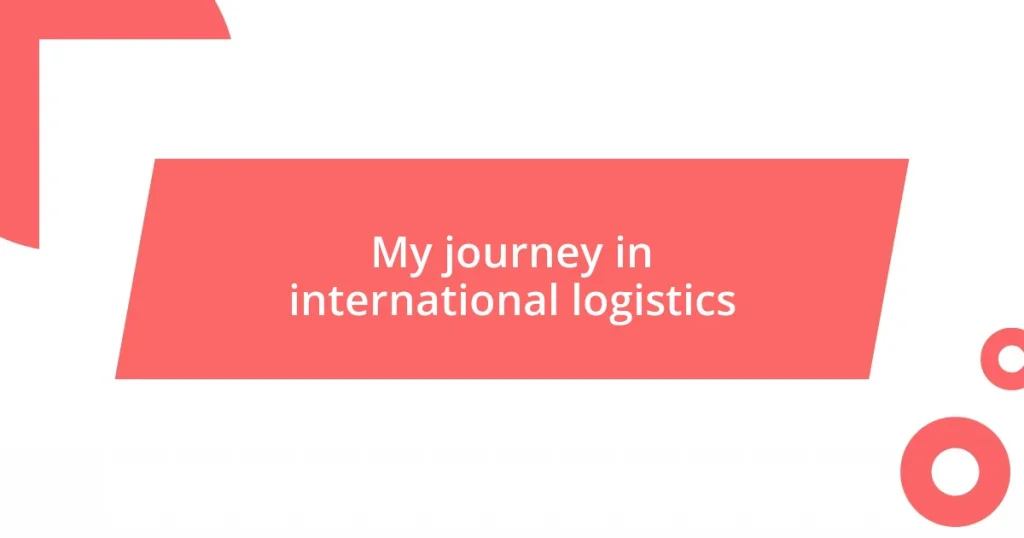Key takeaways:
- Understanding the logistics supply chain highlights the significance of communication and collaboration among suppliers, manufacturers, warehouses, transportation, retailers, and customers.
- Building strong relationships with logistics partners, such as freight forwarders and customs brokers, enhances trust and facilitates smoother operations in complex situations.
- Embracing adaptability, continual learning, and data-driven decision-making are crucial for navigating the ever-changing landscape of international logistics successfully.
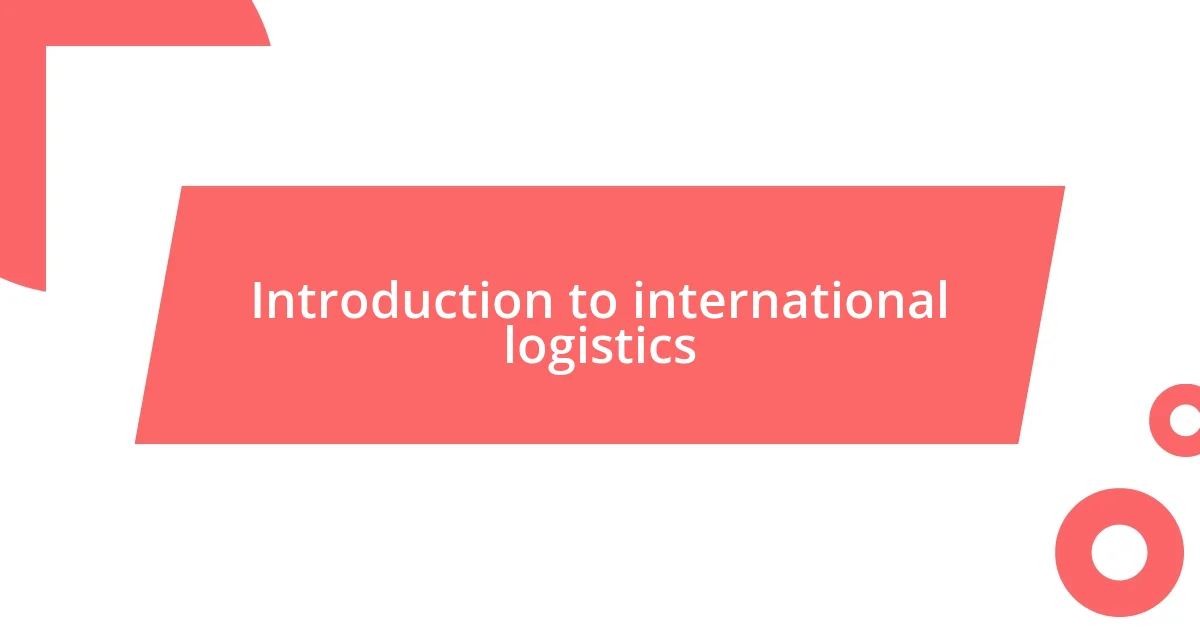
Introduction to international logistics
International logistics is a fascinating tapestry of global trade and intricate supply chains. I remember my first encounter with this field; it was like stepping into a bustling marketplace but on a worldwide scale. The challenge of coordinating shipments across different countries while navigating customs regulations truly opened my eyes to the complexities involved.
Have you ever considered how a product makes its way from a factory halfway around the world to your front doorstep? The coordination required between transportation methods, warehousing, and regulations can be overwhelming. In my experience, understanding each segment of this journey not only added depth to my knowledge but also fed my passion for logistics.
What truly drives international logistics is the pulse of commerce connecting businesses and consumers globally. I often think about the various relationships forged along the way – from exporters to freight forwarders to customs officials. Each interaction tells a story, and those stories are what make this field so dynamic and rewarding.
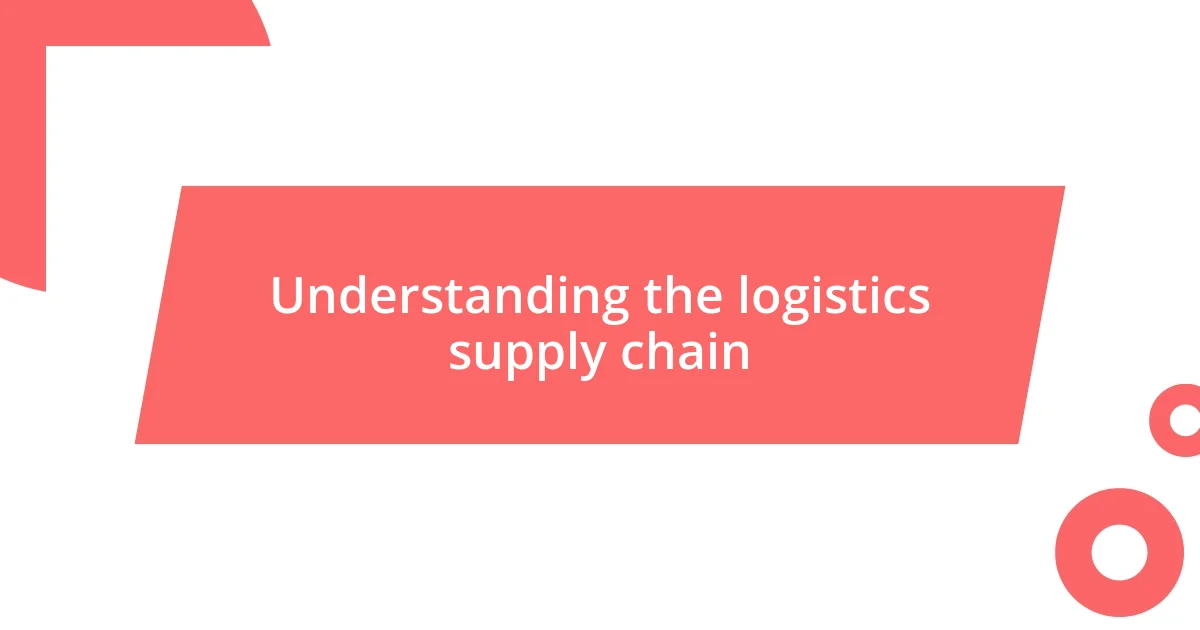
Understanding the logistics supply chain
Understanding the logistics supply chain is like peeling back layers of an onion; each layer reveals crucial components that drive the process. I recall a project where I had to manage the flow of fresh produce from South America to Europe. The need to synchronize demand forecasting with transportation capacities resulted in valuable lessons about the importance of timely information and communication among all players in the chain.
Here are some key components of the logistics supply chain:
- Suppliers: The source of raw materials essential for production.
- Manufacturers: Entities that turn raw materials into finished goods, coordinating closely with suppliers.
- Warehousing: Facilities for storing products before distribution; timing and location are critical.
- Transportation: The actual movement of goods, using various methods like trucks, ships, or planes.
- Retailers: Points of sale where consumers purchase goods, playing a vital role in demand generation.
- Customers: The end-users whose preferences influence every decision in the supply chain.
In my early days, I found it fascinating how each of these elements hinges on effective communication and collaboration. I often think about how a small delay at a supplier’s end can ripple through the entire supply chain, impacting everything from production schedules to customer satisfaction. This interconnectedness makes the logistics supply chain both challenging and exhilarating.
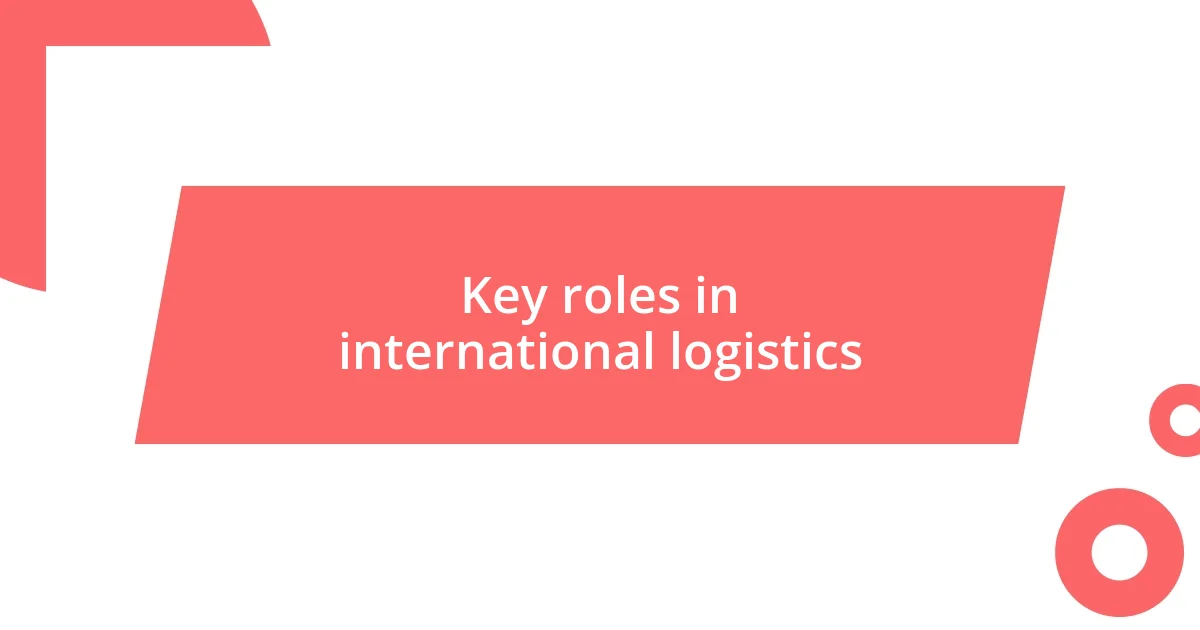
Key roles in international logistics
When I think about the key roles in international logistics, several come to mind, each playing a critical part in the success of a global supply chain. For instance, freight forwarders act as intermediaries between shippers and carriers, ensuring that goods are transported smoothly across borders. I’ll never forget a time when a freight forwarder I worked with quickly resolved a shipping issue that could have cost us a significant delay, reminding me of the crucial nature of their role. It’s these behind-the-scenes heroes that truly make logistics tick.
Customs brokers are another vital component in the logistics ecosystem. They navigate the complex web of regulations and paperwork required for international shipments. During my early career, I was amazed at how a knowledgeable customs broker could save us from unnecessary fees and compliance issues. Their expertise is essential for avoiding the pitfalls of international trade.
Lastly, warehouse managers ensure that goods are stored optimally, ready for timely distribution. In one project, I witnessed how effective warehouse management not only streamlined our operations but also enhanced overall customer satisfaction. When the right products reach the right places at the right times, it transforms the entire logistics experience.
| Role | Description |
|---|---|
| Freight Forwarders | Intermediaries that coordinate transportation and handle logistics with carriers. |
| Customs Brokers | Experts in regulations and paperwork to ensure compliance for international shipments. |
| Warehouse Managers | Oversee storage and inventory management to ensure efficient distribution. |
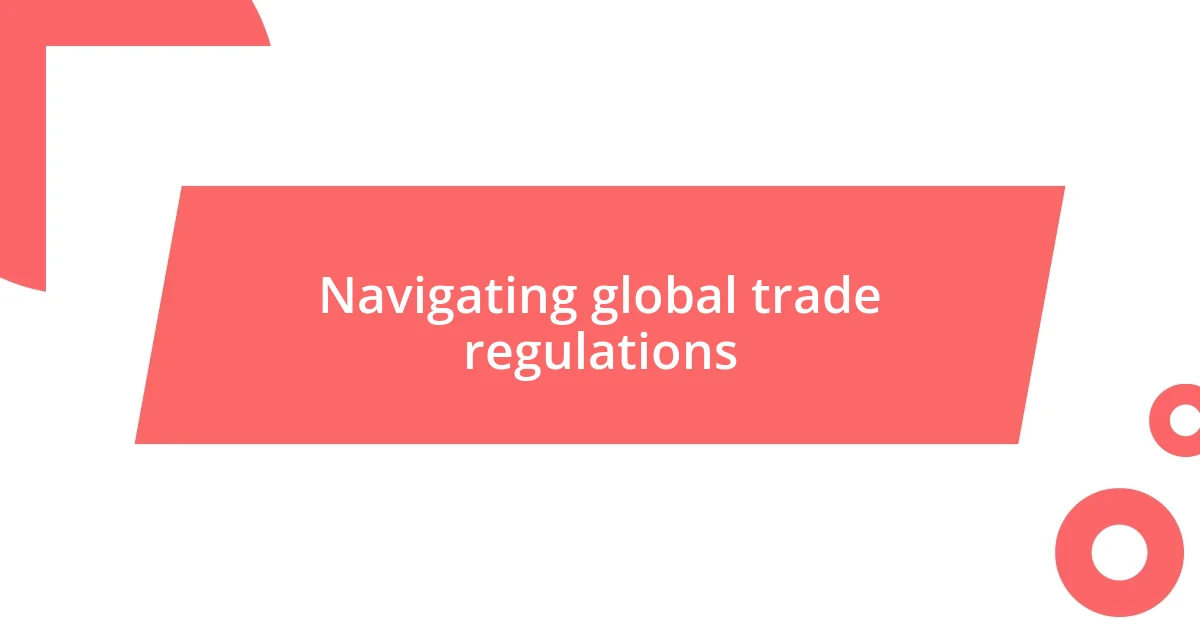
Navigating global trade regulations
Navigating global trade regulations can feel like trying to solve a complex puzzle. From my experience, I’ve learned that understanding the specific requirements of each country is essential to avoid delays and unexpected costs. I remember a time when I miscalculated the import duties for a shipment to China, which led to a significant hit on our budget. If only I had double-checked those regulations!
As I delved deeper into international logistics, I realized that compliance isn’t just about following rules; it’s about building relationships. Collaborating with local authorities and customs officials can provide valuable insights that save time and money. One instance stands out: I attended a workshop organized by a trade association, where I connected with customs agents who were more than willing to share tips on navigating the red tape. Those conversations turned out to be invaluable for our operations.
It’s also crucial to stay updated on changing regulations, as these can shift rapidly. I once faced a situation where new tariffs were announced just days before a shipment was due. Panic set in, but we quickly adapted our strategy, leveraging our network and tools to stay compliant. Have you ever had a last-minute change impact your plans? It’s moments like these where agility truly makes a difference in international logistics.
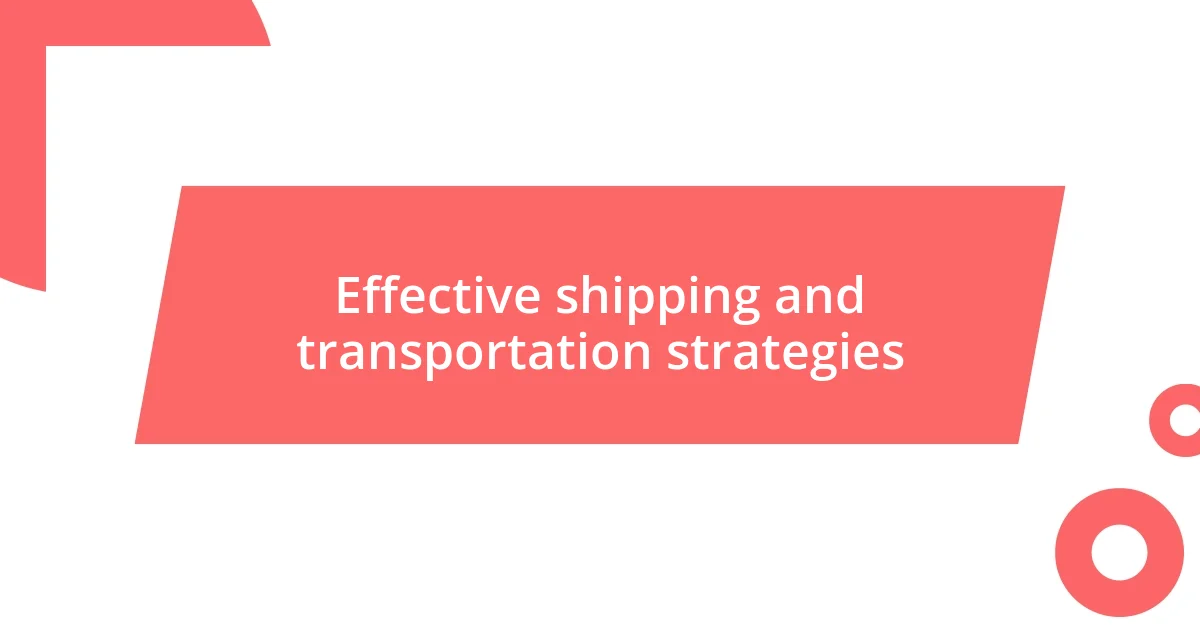
Effective shipping and transportation strategies
One effective shipping strategy that I swear by is choosing the right shipping method. When I first started, I remember opting for express shipping for everything, thinking it would guarantee fast delivery. But I learned that balancing speed and cost can be more beneficial, especially for less time-sensitive shipments. It’s about understanding your product’s journey and the most efficient way to get it there. Have you ever considered how the shipping method affects not just delivery time but overall costs?
Another critical aspect is the use of technology to enhance visibility throughout the shipping process. I once worked with a logistics company that implemented a real-time tracking system, and it changed everything. Not only were we able to proactively manage any issues, but our customers also felt more at ease knowing exactly where their shipments were. It’s fascinating to see how such tools can transform the shipping experience. Have you felt the difference when you’re kept in the loop about your shipment’s whereabouts?
Finally, building strong relationships with carriers often leads to more favorable terms and improved service levels. I recall a time when I nurtured a connection with a local carrier, and because of that rapport, we secured better pricing and priority service during peak seasons. I’ve found that taking the time to establish trust can yield significant benefits down the line. Do you think investing in relationships in logistics can lead to smoother operations in the long run? I genuinely believe it does.
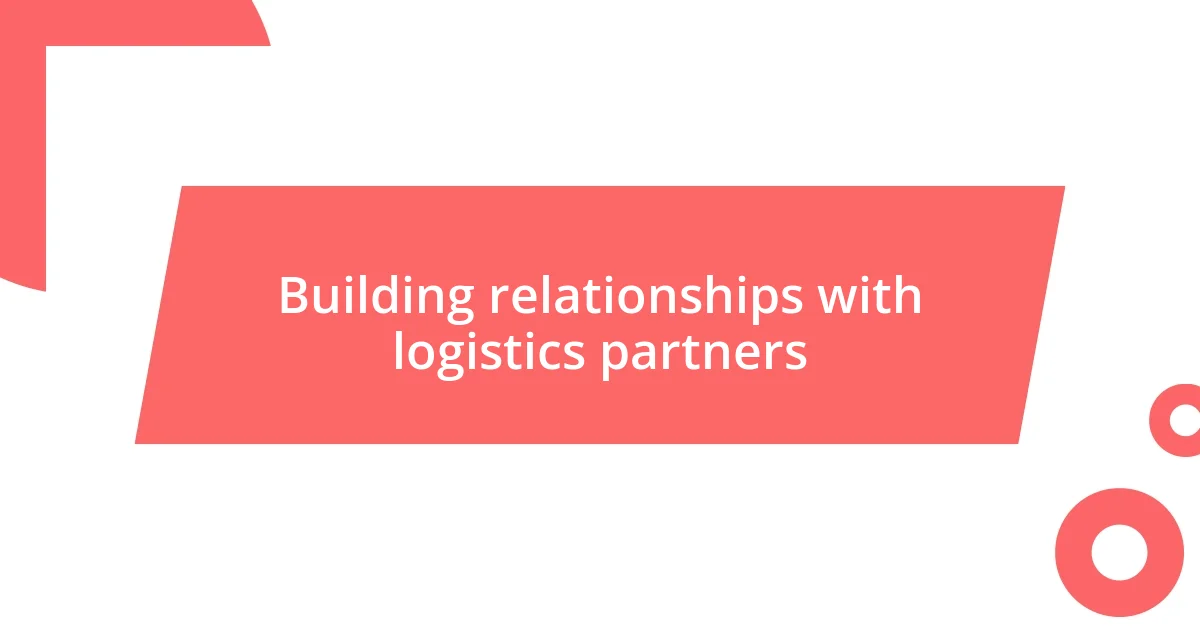
Building relationships with logistics partners
Building relationships with logistics partners is truly a game-changer in international logistics. I vividly remember when I first teamed up with a freight forwarder. Initially, I was apprehensive, trusting a new partner felt risky. However, as we spent more time collaborating, I was amazed at how our mutual understanding grew. We shared goals, communicated openly, and it became clear that we were both invested in each other’s success. Have you ever had that moment when a partner’s commitment makes you feel more secure in your own decisions?
Trust is the cornerstone of any successful partnership. I once encountered a situation where a shipment faced unexpected delays due to unforeseen circumstances. Instead of panicking, I reached out to my logistics partner, who had already lined up alternative solutions. This level of support not only saved our timeline but also solidified my trust in their capabilities. I learned that strong partnerships thrive on honesty and reliability. It’s fascinating how a relationship built on trust can help navigate through uncertainties, right?
Moreover, maintaining regular communication is vital. I often schedule check-in calls, not just to discuss business but to catch up personally as well. I recall a particularly engaging conversation I had with a logistics manager about his experiences during peak seasons. By sharing stories and challenges, we developed a bond that made our professional interactions smoother. Don’t you think that when you understand the person behind the partnership, you can work together more effectively? This personal touch can transform a simple transaction into a fulfilling collaboration.

Lessons learned from my journey
One significant lesson I learned is the importance of adaptability in logistics. I remember a time when a major client requested a last-minute change to their shipment, which caused chaos in my carefully scheduled plans. At first, I felt overwhelmed, but then I realized that being flexible allowed me to find creative solutions. It was a reminder that the logistics landscape is ever-changing, and being prepared to adjust can lead to greater success. Have you ever had to pivot unexpectedly and found it rewarding?
Another key takeaway was the value of continual learning in this field. I used to feel like I had a good grasp on everything after a few years in the industry. But, attending workshops and networking with seasoned professionals opened my eyes to new strategies and trends I hadn’t previously considered. I remember a workshop on sustainable logistics that inspired me to implement more eco-friendly practices in my operations. It’s fascinating how embracing a growth mindset can lead not only to personal development but also positively impact your business. Can you recall a moment when learning something new changed your perspective?
Finally, I learned that data-driven decisions are essential for efficiency. In the early days of my journey, I relied heavily on instinct and experience, which sometimes led to costly mistakes. For instance, after tracking shipping times and reviewing performance data, I identified patterns that helped streamline our processes. This analytical approach transformed how I made choices, allowing for more precise planning. I’ve found that integrating data not only drives efficiency but also builds confidence in decision-making. Have you noticed how leveraging data can reshape your operational strategies?










